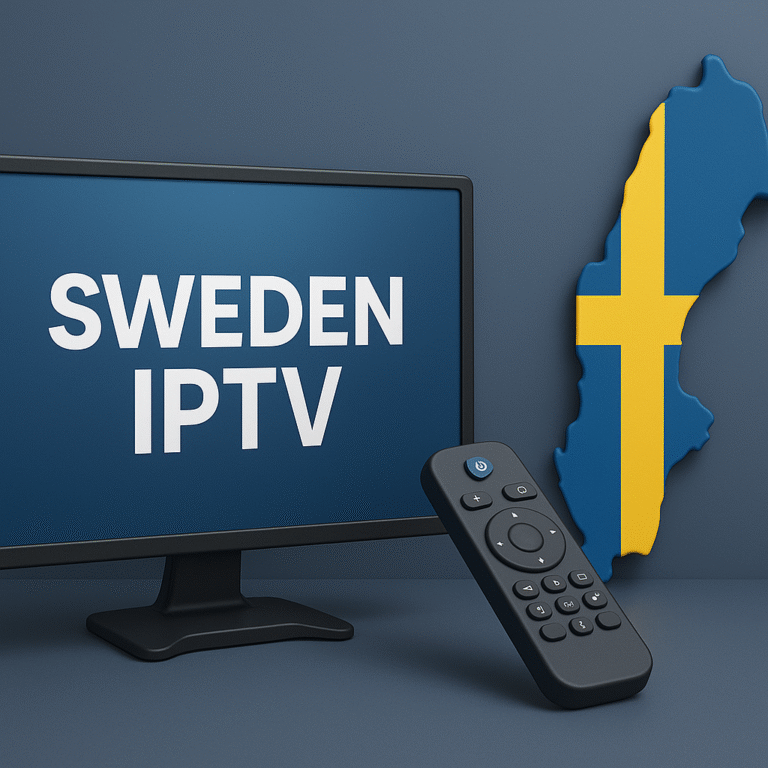Geoblocking and IPTV: How viewers in Germany access international content

Geoblocking and IPTV in Germany: How Viewers Access International Shows and Movies
Geoblocking controls what viewers in Germany can watch online by limiting access based on location. IPTV (Internet Protocol Television) offers a way to stream shows and movies through the internet, but many international programs remain restricted by these regional barriers. For viewers eager to explore content beyond Germany’s borders, these limits can be frustrating.
Rules and regulations play a big part in what’s available, making it tricky for some to access global content freely. Understanding how geoblocking works and how IPTV fits into the picture helps explain why this is such a common challenge. This post will look at how people in Germany use IPTV to reach international shows despite these restrictions.
Understanding Geoblocking and Its Impact on IPTV
When it comes to streaming shows and movies over IPTV in Germany, geoblocking often stands in the way. This practice controls what content you can access based on where you are located. To understand why some programs are locked away and how viewers try to get around these limits, it helps to look closer at what geoblocking really means and how it works with IPTV services.
What is Geoblocking?
Geoblocking is a method that restricts access to online content depending on a user’s geographic location. Think of it like a virtual gatekeeper that allows or denies entry based on where your internet connection appears to come from. If a TV show or movie is only licensed for viewers in certain countries, geoblocking prevents streaming outside those areas. This means even if you find the content online, the system might stop you from watching because your IP address shows you’re in Germany.
How Geoblocking Works on IPTV Platforms
IPTV streams TV content via the internet instead of traditional cable or satellite. Yet, it still faces the same regional restrictions as other streaming services. IPTV platforms check the IP address linked to your device to determine your location. If the content provider has limited the rights to certain countries, the platform blocks your access if you’re outside those borders. This makes many international channels or shows unavailable or replaced with local versions.
The blocking can happen in different ways:
- Complete block where content just won’t load.
- Redirect to local content that’s allowed in Germany.
- Display of error messages explaining the content is unavailable.
Legal and Licensing Reasons Behind Geoblocking
Geoblocking isn’t just a random rule; it comes down to legal contracts and licensing deals. Content owners sell rights to show movies and series by country or region. This means a streaming service can only legally offer certain content where it holds the rights. For example, a US show might be licensed to a platform in America but not in Germany. If German viewers accessed it freely, it could break these agreements.
Broadcasters and studios want to protect their investments and control who can stream their content and where. This lets them handle advertising, pricing, and distribution separately in each market. So, geoblocking protects these business deals and keeps content providers within legal boundaries.
Common Types of Geo-restrictions Faced by German Viewers
Viewers in Germany often run into several familiar geo-restrictions when using IPTV:
- Blocked international channels: Some popular channels available abroad don’t show up at all.
- Delayed episode availability: Foreign series may arrive days or weeks late on German streams.
- Regional library differences: Streaming platforms offer smaller or different selection in Germany compared to other countries.
- Sports and live events blackout: Certain sports matches or live shows are only allowed to stream in specific locations.
These restrictions can feel like invisible walls between German viewers and the global content they’re eager to watch. Recognizing the rules behind geoblocking gives a clearer picture of why these limits exist and what IPTV users deal with every day.
Legal Framework and Regulations on Geoblocking in Germany
Understanding why geoblocking exists and how it shapes what you can watch on IPTV in Germany means looking at the laws behind it. Both European Union rules and German laws set the boundaries for what’s allowed when it comes to accessing international content. They work together to strike a balance between protecting content creators and giving viewers more freedom.
European Union Regulations Impacting Geoblocking
The EU has taken active steps to reduce unfair geoblocking and promote easier access to online content across member states. Several key regulations apply:
- The Geo-blocking Regulation (EU) 2018/302: This law stops unjustified blocking or limiting of access to websites based on your location. It means online stores and services can’t automatically block you or redirect you away because you’re in Germany or another EU country.
- Audiovisual Media Services Directive (AVMSD): This directive sets rules for TV and video-on-demand services across Europe. It requires member states to make sure these services respect rights and consumer protections while promoting cross-border access.
While these laws encourage less restrictive access, they don’t completely remove regional content licenses. They only limit unfair treatment based on location, like preventing sellers from charging different prices or denying access without cause.
German National Laws Affecting IPTV Content Access
Germany’s national rules back up the EU framework but also add specific protections and conditions:
- Copyright and Licensing Laws: Germany enforces strict copyright laws. Content makers sell licenses by territory, meaning services must respect these boundaries when streaming shows or movies.
- Interstate Treaty on Media (Medienstaatsvertrag): This treaty governs broadcasting and streaming in Germany. It demands transparency, proper licensing, and adherence to content rules, which influence what IPTV providers can offer.
- Telemedia Act (TMG): This law covers online services, including IPTV platforms. It requires providers to secure user data and meet legal standards, indirectly affecting how services operate and handle access.
Together, these laws create a framework that prioritizes legal compliance in content distribution. IPTV providers in Germany must navigate these rules carefully when offering international content.
Recent Developments in Geoblocking Legislation
Legislation on geoblocking and content access is evolving, reflecting changes in technology and consumer habits. Recent updates include:
- EU Efforts to Expand Cross-Border Portability: New initiatives aim to allow subscribers to use their streaming services across EU countries without losing access. This means German viewers can watch shows from their home subscriptions while abroad more easily.
- Increased Focus on Transparency: Both EU and German regulators push IPTV services to clearly inform users about geoblocks or restrictions before purchase or use.
- Growing Enforcement Actions: Authorities have started cracking down on unjust geoblocking and unauthorized content sharing. IPTV providers face more audits to ensure they respect licensing rules.
These changes try to balance protecting rights holders while making international content easier to access. For viewers in Germany, this means gradual improvements even though some restrictions will remain.
By understanding the legal setting behind geoblocking, you can better see the limits and possibilities when using IPTV to watch international content. The rules protect content creators but also slowly open doors for viewers.
Methods German Viewers Use to Access International IPTV Content
Many viewers in Germany look for ways to get around geoblocks to watch shows and channels from other countries. Since IPTV lets you watch TV over the internet, it’s become a popular way to stream international content. Here’s a look at the main methods Germans use to unlock content beyond their borders and the issues that come with these workarounds.
Virtual Private Networks (VPNs) and Smart DNS Services
One of the most common approaches is using a VPN or Smart DNS service. These tools change your internet connection’s apparent location so the IPTV service thinks you’re browsing from another country.
- VPNs create a secure tunnel for your data and route it through servers in different countries. This masks your real IP address and makes it look like you’re accessing content from, say, the U.S. or the UK.
- Smart DNS works a bit differently by redirecting only certain parts of your traffic related to location verification without encrypting your whole connection. This can make streaming faster and avoid speed drops common with VPNs.
Both options are affordable and user-friendly. You just pick a server in the country you want, connect, and then open your IPTV app or website. However, some streaming platforms have started detecting and blocking popular VPN servers, so it’s a constant cat-and-mouse game.
Proxy Servers and IP Spoofing
Another method involves proxy servers and IP spoofing. These are technical ways to disguise your IP address and make it appear as if your request comes from permitted locations.
- A proxy server acts as a middleman, passing your request through a different computer before reaching the IPTV service. This hides your true address and can bypass geo-restrictions.
- IP spoofing tricks the IPTV platform by faking the IP address in your internet requests.
These methods can work but are generally less reliable and more complex to set up than VPNs. They often lack encryption, which leaves your data vulnerable to interception. Plus, many IPTV providers have security measures that detect proxies and block them.
Legal IPTV Services with International Content
Some viewers prefer to stick with legal IPTV providers that offer legitimately licensed international content. These services often partner with broadcasters worldwide or purchase content rights for multiple countries.
- Platforms like Zattoo, Magine TV, or even certain packages on Amazon Prime Video and Netflix can include international channels or shows accessible to German users without tricks.
- These legal options guarantee better stream quality and avoid the risks tied to unofficial methods.
Though these services don’t offer every foreign show, they provide a safe way to access international programming while respecting copyright laws.
Risks and Limitations of Circumventing Geoblocks
While bypassing geoblocks sounds appealing, it carries several risks and downsides.
- Service bans and errors: Streaming platforms actively block IP addresses linked to VPNs, proxies, or spoofed IPs. This can cause freezing, buffering, or outright denial of service.
- Legal concerns: Using VPNs or proxies to break licensing agreements might violate the terms of service of IPTV providers, potentially leading to account suspension.
- Security issues: Free or unreliable services can put your data at risk or expose you to malware.
- Quality problems: Connections routed through distant servers often suffer slower speeds, leading to lower video quality and more buffering.
Knowing these risks helps viewers weigh their options carefully when trying to access international IPTV content in Germany. It’s important to prioritize solutions that balance access, safety, and lawfulness.
Impact of Geoblocking on Consumers and Content Providers
Geoblocking doesn’t just decide what content you can watch; it shapes the entire viewing experience and the way content is distributed. For IPTV users in Germany, it affects how easily they access global shows and movies, while content providers must balance legal rules with user demands. Let’s look at how geoblocking influences both sides and where the IPTV market is headed.
Consumer Frustration and Demand for Global Content Access
Many viewers feel stuck behind invisible walls, unable to watch popular shows or channels from other countries. This creates frustration and a sense of missing out, especially as global culture spreads faster than traditional licensing rules can keep up.
- Viewers want more freedom to stream international content without delays or restrictions.
- They expect access to the latest episodes, major sports events, and diverse shows without jumping through hoops.
- The rise of IPTV and smart devices has made people used to instant access, so geoblocks feel like a step backward.
This frustration drives users to seek workarounds, such as VPNs or proxy servers, even if those come with risks or lowered streaming quality. The push for more content variety shows viewers want a smoother, more open experience.
Implications for Content Providers and Broadcasters
For content providers, geoblocking is a balancing act. They need to respect contracts and territorial rights but also want to keep audiences happy and avoid losing customers to alternative platforms.
- Licensing deals force providers to divide rights by country, limiting where content can appear.
- Providers must manage different release dates, advertising deals, and pricing models based on regions.
- This can slow global content distribution and limit audience reach.
- Broadcasters risk losing viewers to illegal streams or VPN-based access, cutting into revenue and user data insights.
At the same time, content owners see opportunity in global demand. Some are trying to simplify rights deals or offer international packages through IPTV, but the legal and business challenges remain complex.
Market Trends in IPTV and Content Distribution
The IPTV market is reacting to geoblocking pressures by exploring new models and technologies that could reshape content access.
- Services are increasingly offering cross-border subscriptions within the EU due to regulations allowing portability.
- IPTV platforms are partnering with international studios to secure broader licensing rights, aiming to reduce regional content gaps.
- There’s a rise in hybrid IPTV models combining legal regional content with user-friendly access tools.
- The market sees growing investment in technologies that detect and prevent unauthorized access while maintaining a good user experience.
In Germany, IPTV providers are caught between strengthening regional contracts and increasing consumer demand for unrestricted access. The tide is moving slowly toward more inclusive content offerings, but geoblocking still plays a major role in shaping what viewers can watch.
Geoblocking impacts everyone—from the viewer eager for fresh international shows to the content owner protecting their business. As IPTV grows, these challenges will continue to shape the future of streaming in Germany and beyond.
Future Trends and Potential Changes in Geoblocking Practices
Geoblocking isn’t a fixed practice; it’s shifting with new technologies, regulations, and how viewers want to watch content. For IPTV users in Germany, these changes matter a lot—they could ease access or reshape the way streaming services handle content rights. Let’s explore some of the trends and possible shifts on the horizon.
Emerging Technologies Impacting Geoblocking
Technology continues to adjust how geoblocking works, sometimes making it tighter, other times softer.
- Advanced Location Detection Streaming services are getting better at pinpointing user locations with more than just IP addresses. They may use device data, GPS signals, or even AI tools to verify where a viewer really is. This can tighten geoblocking but might also lead to more accurate enforcement, cutting down on false blocks.
- Decentralized Streaming and Blockchain Some startups experiment with blockchain to distribute content. This could bypass traditional licensing checks, challenging current geoblocking methods by making content harder to control by region. It’s still early, but it could shake up how IPTV platforms manage rights.
- Improved VPN Detection Services are better at spotting and blocking VPNs or proxies used to bypass geoblocks. Expect more sophisticated filter systems that can identify disguised IPs, meaning viewers might find common workarounds less effective.
- AI-Powered Content Delivery Artificial intelligence can optimize what to show based on location and preferences, and potentially tailor content availability dynamically. It might offer more personalized access while trying to stick within licensing rules.
These technologies suggest geoblocking won’t disappear soon but will become more precise and flexible, depending on service goals.
Prospects for Regulatory Reforms and Harmonization in the EU
Regulations evolve as the EU works to balance consumer rights with copyright rules, shaping how geoblocking will operate across member states.
- Greater Cross-Border Access Policies promoting cross-border portability are increasing. Soon, viewers might subscribe in one EU country and stream their content seamlessly anywhere in the bloc. This would reduce geoblocking within Europe, making IPTV more open for German users.
- Harmonized Licensing Rules The EU is discussing ways to simplify licensing, pushing for agreements that cover multiple countries instead of separate ones. If this happens, IPTV services could offer broader international content libraries with fewer regional gaps.
- Stronger Consumer Protections Regulators want clear information on content restrictions before purchase or use. This transparency could help viewers understand geoblocking limits upfront and reduce complaints.
- Pressure on Providers Authorities may increase controls over unfair geoblocking and push IPTV platforms to avoid overly strict restrictions that don’t align with market realities. Germany and other countries might tighten laws to support this shift.
These reform efforts point to a future where geoblocking boundaries soften within Europe but still respect content owners’ rights.
Shifts in Consumer Preferences and IPTV Service Models
Viewers’ habits and expectations influence how IPTV services respond to geoblocking.
- Demand for More International Content German viewers want easier access to worldwide shows and channels. Instead of dealing with delays or missing content, audiences prefer services that offer broad and timely selections. IPTV providers will feel more pressure to meet this demand.
- Subscription Flexibility More users expect IPTV plans that work across devices and locations, including while traveling. Services that lock users into single-country access risk losing customers to more open competitors.
- Hybrid Service Models IPTV is seeing mixes of licensed content with user-generated or community-shared streams. This model can expand available shows beyond traditional licenses but comes with legal and quality challenges.
- Integration with Smart Home and Mobile Tech As smart TVs, voice assistants, and mobile devices grow in use, IPTV platforms adapt by offering smoother cross-device experiences. This puts a spotlight on consistent content access and may reduce tolerance for strict geoblocking.
IPTV providers will need to balance legal limits with user-friendly features, or risk losing viewers looking for global content with fewer barriers.
Changes in technology, policy, and viewer habits are shaping how geoblocking works today and could open new possibilities for IPTV users in Germany. While restrictions won’t vanish overnight, the rules of the game are evolving in ways that may soon feel more natural and less frustrating for international content fans.
Conclusion
Geoblocking limits what German IPTV viewers can watch by enforcing location-based content rules. Many turn to VPNs, proxies, or legal international services to bypass these walls, each with benefits and risks. The legal landscape aims to balance protecting rights holders and easing access, but restrictions remain a part of the experience.
Technology and policy changes hint at a future with fewer barriers, especially within the EU, while consumer demand pushes providers to offer more global content. Staying informed about these shifts helps viewers make smart choices and get the most from their IPTV experience. Thank you for reading, and feel free to share your thoughts on how geoblocking affects your viewing habits.






